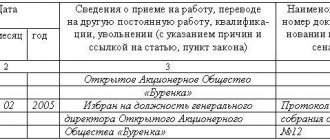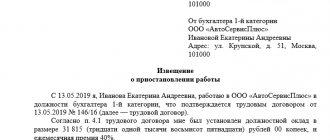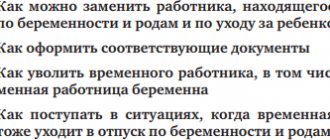Before finally hiring a new employee, most employers first offer him to undergo a probationary period. This period is difficult not only for the employee, but also, to some extent, for the management of the organization. How to arrange a probationary period, how much to pay for it, how to fire an employee if he failed to cope with the assigned functions - the employer faces quite a lot of questions. Let's look at this issue in more detail.
Is there a probationary period for people with disabilities when hiring?
What is the essence of a probationary period and why is it needed?
The probationary period is the time when an applicant for a position has not yet been finally accepted into the company’s staff, but has already begun to perform work tasks. The purpose of the test for the employer is to check how well the employee matches the vacancy in terms of his work skills and abilities, and to make sure that he is suitable for the team in terms of personal qualities. For the applicant, the probationary period is also important - he can understand in a short time whether he is able to cope with the assigned tasks and whether the work meets his expectations.
Are there any specifics to laying off an employee during a probationary period ?
Attention! It is illegal to allow an employee to work without concluding an employment contract with him, even if we are talking only about a probationary period. The law requires that the fact of employment, even during the probationary period, be documented. Otherwise, the employer will face administrative liability and large fines.
Extension
Is it possible to extend the probationary period with a fixed-term employment contract?
Actually, it's not possible . The time that the Labor Code provides for the manager to make a decision should be quite enough to make up his mind. But, as is most often the case in Russian legislation, if it is really necessary, then it is possible , and in this case.
It’s one thing if the candidate worked honestly and continuously during the test, without sick leave or time off. And it’s completely different if they did exist.
In this case, the employer issues an appropriate order - an extension - in accordance with the local standards of the company.
Here's what it says:
- Passport information of the applicant, what position he is working in;
- Full name of the company.
- Document Number.
- Why does the employer extend the test?
- Based on what document?
- Date, signature, seal.
Documents explaining the reason for the extension (for example, sick leave) must be present.
And the extension period itself cannot be more than what the employee missed.
This document must also be presented to the subject for review.
Documentation of the probationary period
As soon as an employee begins to perform his job duties, he is considered to have already been hired. Even if it is just a probationary period and even if there are no written contractual obligations with it.
However, in order to avoid disagreements with the law, the employer should take care of the documentary side of the probationary employment in advance. In particular, the main document regulating the relationship between the organization and the employee for the period of inspection is the employment contract . At the same time, it must certainly contain a section on the probationary period with a clearly defined period and its conditions.
How to dismiss an employee at his own request during the probationary period ?
In situations where an employee begins to work without drawing up an employment contract, a separate agreement on a probationary period must be concluded with him in advance, which will subsequently be included in the employment contract.
For your information! If a person started working without a written employment contract or the employment contract does not stipulate a probationary period, the law regards this as the employer hiring the employee without passing a test.
Verbal agreements have no meaning.
Termination of a fixed-term employment contract with a pregnant woman
If we talk about open-ended employment contracts, then an employer, concluding a fixed-term employment contract, can actually fire a pregnant woman. Termination of an employment contract due to the expiration of its term (clause 2, part 1, article 77 of the Labor Code of the Russian Federation) refers to the general grounds for termination of the contract. However, the procedure for dismissing women on this basis in some cases has its own characteristics.
Termination of a fixed-term employment contract with a pregnant employee is possible in the following cases (Articles 77, 261 of the Labor Code of the Russian Federation):
- at the request of the employee herself;
– by agreement of the parties;
– if a pregnant employee fails to perform actions related to the extension of a fixed-term employment contract;
– when a temporarily absent employee returns to work, if a pregnant woman performed his duties and it is impossible to transfer her to another available job before the end of her pregnancy (if she agrees to such a transfer);
– upon liquidation of an organization (termination of activity of a branch, representative office or other structural unit of the organization) in which a pregnant employee works, or termination of activity by an individual entrepreneur.
An employer has the right to dismiss a pregnant woman after the expiration of the employment contract, subject to the following conditions (Part 3 of Article 261 of the Labor Code of the Russian Federation):
– a fixed-term employment contract was concluded for the duration of the duties of the absent employee;
– transfer of an employee with her consent to another job available to the employer and not contraindicated for her for health reasons is impossible.
The algorithm is as follows.
1 step. Establishing the fact of pregnancy.
The fact of pregnancy is established on the basis of documents provided by the woman from the antenatal clinic.
Step 2. Extension of a fixed-term employment contract until the moment of childbirth.
The duration of the employment contract must be extended until the end of the pregnancy, regardless of the reason for its end - the birth of a child, spontaneous miscarriage, abortion for medical reasons, etc. This follows from Part 2 of Art. 261 Labor Code of the Russian Federation, para. 1, 3 clause 27 of the Resolution of the Plenum of the Supreme Court of the Russian Federation dated January 28, 2014 No. 1.
You must submit a written application to the employer for such an extension and a certificate confirming your pregnancy status. Otherwise, the employer is not obliged to renew the employment contract (Part 2 of Article 261 of the Labor Code of the Russian Federation).
By virtue of Part 2 of Art. 261 of the Labor Code of the Russian Federation, a fixed-term employment contract cannot be terminated until the end of pregnancy. The pregnancy status is confirmed by a medical certificate provided by the woman at the request of the employer, but not more than once every three months.
A fixed-term employment contract is extended until the end of a woman’s pregnancy, regardless of the reason for the end of the pregnancy (birth of a child, spontaneous miscarriage, abortion for medical reasons, etc.). In the event of the birth of a child, the dismissal of a woman due to the end of a fixed-term employment contract is carried out on the day the maternity leave ends. In other cases, a woman may be fired within a week from the day the employer learned or should have learned about the end of the pregnancy.
Step 3. Calculation of compensation and payment of benefits.
A woman is entitled to the same compensation that is paid upon termination of a fixed-term employment contract, for example, compensation for unused vacations. The benefit is paid for the entire period of maternity leave in the amount of 100% of the woman’s average earnings (Part 1 of Article 11 of the Law of December 29, 2006 No. 255-FZ).
The amount of the benefit is determined by multiplying the amount of the daily benefit by the number of calendar days falling during the period of maternity leave (Part 5 of Article 14 of Law No. 255-FZ).
Step 4 Termination of the contract and familiarization against signature.
To avoid risks, it is important that the employee is familiar with the order upon signature. In addition, on the last working day all payments are made and a work book is provided.
There are specifics for terminating a contract if the employee has already held a maternity position. According to Art. 79 of the Labor Code of the Russian Federation, a fixed-term employment contract is terminated upon expiration of its validity period. The employee must be notified in writing of the termination of the employment contract due to its expiration at least 3 calendar days before dismissal, except in cases where a fixed-term employment contract concluded for the duration of the duties of the absent employee expires.
An employment contract concluded for the duration of the duties of an absent employee is terminated when this employee returns to work.
Part 3 art. 261 of the Labor Code of the Russian Federation provides for the possibility of dismissing a woman due to the expiration of the employment contract during her pregnancy, if the employment contract was concluded for the duration of the duties of an absent employee, and it is impossible, with the written consent of the woman, to transfer her to another job available to the employer before the end of pregnancy (as a vacant position or work that corresponds to the woman’s qualifications, as well as a vacant lower position or lower paid job) that a woman can perform taking into account her state of health. In this case, the employer is obliged to offer her all the vacancies that he has in the given area that meet the specified requirements. The employer is obliged to offer vacancies in other localities if this is provided for by the collective agreement, agreements, or employment contract.
Registration of a probationary period in a work book: to write or not
The question of whether it is necessary to make an entry about the probationary period in the work book interests many employers.
The law clearly establishes that there is no need to mention a probationary period in the work book; only a record of hiring is made in it, and from the date on which the employee began performing work duties in the verification mode.
The employer must make all the necessary entries in the work book of each employee who has worked for him for more than 5 days, but only if this is a permanent place of work for the person.
How to draw up an employment contract with a probationary period ?
Thus, the condition of the probationary period is fixed only in the employment contract.
How and for whom can such an agreement be concluded?
What is a fixed-term contract?
In companies, especially large ones, circumstances often arise when hiring an employee is required for a short period of time. Most often this happens when it is necessary to perform small one-time tasks, or during an emergency, or if it is necessary to replace an employee on maternity leave.
For example, you need to hire an additional accountant, a cleaner, a dishwasher, a poster poster, a courier, and so on.
Usually in this situation, the future employee is offered not an open-ended contract, but a fixed-term one. The question often arises: is a probationary period required for this type of work? How long can it last and is it always necessary? How is the probationary period and the requirements for its successful completion established?
Duration of probationary period
The probationary period cannot be endless and the Labor Code clearly establishes a time limit for checking the suitability of a new employee for the position held - three months, that is, 90 calendar days . After the three-month period, the employer must decide whether he is satisfied with the person or whether it is better to part with him.
But there are exceptions :
- Employees who have entered into an employment contract for a period of 2 to 6 months, as well as those employees who are engaged in seasonal work, are entitled to undergo testing for no more than two weeks;
- Executive employees, for example, directors of organizations, branches and structural divisions, and their deputies, as well as chief accountants and their deputies, can be tested for 6 months;
- officials hired for the first time in the civil service or who have moved from one position to another must work in a probationary mode in a new place for 3 to 6 months.
Important! After making sure that the new employee is completely satisfied with him, the employer can shorten the probationary period. But he has no right to renew it under any circumstances.
It should be remembered that there are certain periods of time that cannot be included in the test period. For example, if:
- the employee was on sick leave;
- was engaged in public or government duties;
- went on short leave without salary;
- was on vacation due to training;
- was actually absent from work for any other valid reasons.
Attention! The probationary period must be included in the length of service, giving him the future right to planned paid annual leave.
Results
Article 70 of the Labor Code of the Russian Federation contains rules according to which, during employment, the employer can establish a check for a new employee for a limited time. This probationary period according to the Labor Code in 2021 cannot be more than 3 months (and for managerial positions - 6 months). If the work is supposed to be short-term (from 2 months to six months), then no more than 2 weeks. And if the employment period does not exceed 2 months, then the probationary condition cannot be specified at all.
At the end of the probationary period, the employer must decide whether the employee is suitable for him or whether he needs to be fired.
If the employee continues to work after completing the test, then he is considered hired. You can find more complete information on the topic in ConsultantPlus. Free trial access to the system for 2 days.
Payment for the probationary period
By law, work during the probationary period must be paid by the employer, and in exactly the same way as if the employee was already on staff on a permanent basis.
The legislator explains this requirement simply: since work is performed in these two cases equally and in equal importance, then infringement of the rights of an employee on probation will be considered a violation of the law.
How is the probationary period by an employee?
However, employers are not always ready to put up with this state of affairs and quite often circumvent this rule. And they do it quite legally too. For example, for the period of a probationary period, an employment contract may be concluded with an employee with a salary specified in it, as if permanent. After passing the test, this employment contract is terminated by mutual consent of the parties and a new one is concluded with a higher salary. Another way: payment of bonuses and additional payments to the organization, depending on the length of service in it.
Is it installed?
The Labor Code of the Russian Federation (LC RF) does not oblige employers to establish a probationary period for new employees, but does not deprive them of this right. When selecting an employee for a certain position, every manager wants to get a qualified employee, and a fifteen-minute interview, of course, will not provide an opportunity to verify the candidate’s competence. Therefore, when hiring, even under the terms of a fixed-term contract, employers prefer to assign a probationary period to newly hired employees.
According to Art. 70 of the Labor Code of the Russian Federation, before assigning a test to a candidate, the employer must discuss this point with him; if the candidate agrees, this clause is included in the employment contract, and the employee confirms his consent with a personal signature.
From a legal point of view, the parties must agree on a voluntary basis to establish a trial period.
A fixed-term employment agreement is concluded for a specific period of time. One of the points in the document indicates the time period during which the employee undertakes obligations to perform established job functions. The probationary period depends on the validity period of the employment contract and should not contradict the law (Article 70 of the Labor Code of the Russian Federation).
Categories of citizens to whom it cannot be assigned
Article 70 of the Labor Code of the Russian Federation establishes a number of restrictions, taking into account which not all candidates for a position must pass tests.
So, the following are exempt from it:
- persons applying for an open vacancy based on the results of a competition held on the basis of labor legislation;
- minor citizens;
- women during pregnancy, as well as mothers with children under 1.5 years old;
- persons who have graduated from an educational institution and are employed for the first time within one year from the date of graduation;
- elected to elective office;
- if an employee is transferred from another place of work based on a decision made between the heads of two enterprises;
- persons who are employed for a period of up to 2 months;
And also in other cases specified in the Labor Code of the Russian Federation, other regulations or in the collective labor agreement.
In what cases is the test not necessary?
Candidates cannot be assigned a probationary period in the following situations:
- if a person, by his own consent or by appointment of a manager, begins to perform work for a specified period;
- if, when signing the employment agreement, the document did not include a clause regarding the probationary period of a particular employee;
- if the employment relationship between the parties is formalized for a period of up to 2 months.
Who has the right not to undergo probation?
There are certain categories of employees who are not required to pass a test when hired. These include:
- women who are expecting a child and have children under three years of age;
- minors;
- those who are transferred from one organization to another by agreement between employers;
- employees appointed to a position after passing a competition in the manner prescribed by law;
- employees under an employment contract valid for up to two months;
- other persons prescribed in the Labor Code of the Russian Federation.
Can you be fired during a trial?
It is common for an employer to terminate a contract after an applicant fails a background check. But there are situations when you have to part with an employee earlier.
Managers are allowed to use dismissal as a disciplinary sanction for various reasons: from a one-time violation of duties (clause 6, part 1, article 81 of the Labor Code of the Russian Federation) to loss of confidence in the employee (clause 7, part 1, article 81 of the Labor Code of the Russian Federation). These rules also apply to persons who work under fixed-term contracts.
What to do if a new employee fails the probationary period
If during the testing process it turns out that the employee is not suitable for performing the tasks assigned to his job duties, the management of the enterprise can fire him. Moreover, this must be done during the test period , or, in extreme cases, on its last day. Otherwise, the employee will be considered to have successfully completed the test.
Important! During the probationary period, the employer should closely monitor how the employee completes the tasks given to him. If they are untimely or of poor quality, this must be recorded (for example, in official memos and memos). In the future, if events develop unfavorably, scrupulous documentary support of the test will facilitate the collection of evidence to justify the dismissal of an employee who failed the test.
The employee must be notified of the impending dismissal at least three days in writing. The notification must necessarily indicate the reasons why it is believed that the employee did not pass the test, as well as attach documents confirming them.
To summarize, we can draw the following conclusion: the probationary period is the time when, despite particularly close attention from the employer, the new employee has all the rights and responsibilities of employees on a permanent basis. You need to approach the registration of a probationary period in strict accordance with the requirements of the law - this will allow you to avoid claims in the future, both from the staff and from the controlling structures.
Dismissal
How to fire during a probationary period with urgent work?
This can happen at the will of both the employer and the subject himself.
The employer, if he does not like the candidate , has the legal right to get rid of him (Article 71 of the Labor Code) and no urgency of the contract will be an obstacle to this.
The director must officially notify the employee in writing at least three days before the intended dismissal .






